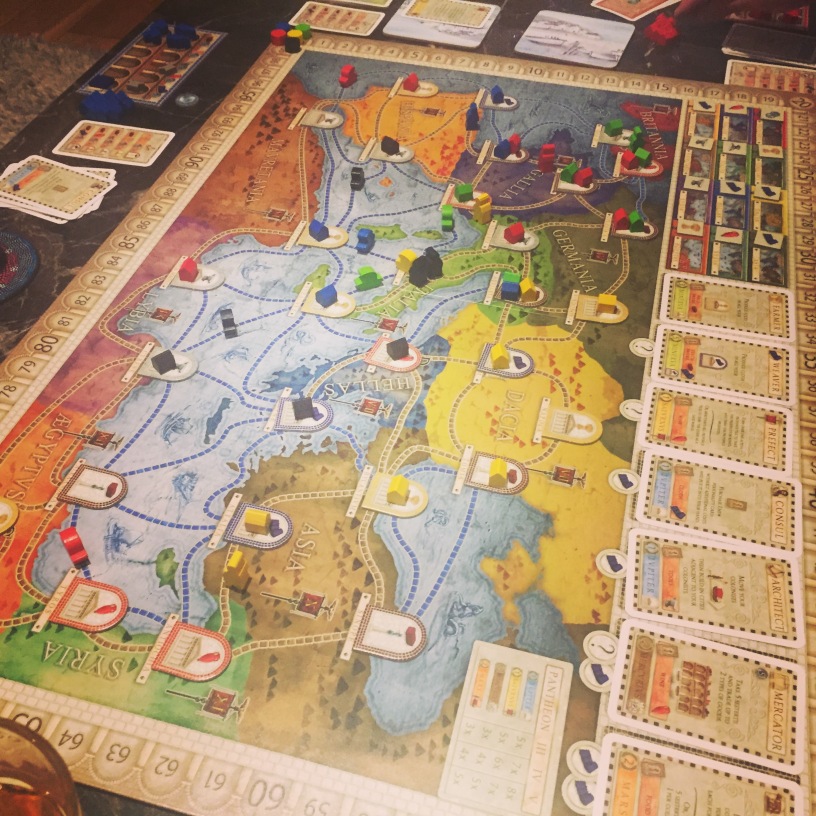Type: Deck Management / Rondel / Euro
Time to play: < 1 hr 30 minutes (Teaching: 15 minutes)
Best played with: 2-5 players (Best with 5)
So not every Euro these days is about trading in the Mediterranean but sometimes you have got to – and that’s when it’s time to pull Concordia off the shelf! This archetypal game has a few really interesting mechanics from territorial expansion, to deck management and even a “build your own Euro” scoring system. All that and yet the rule book is 6 pages and easy to follow.
This is a game that kicks off with all players running out from Rome in some sort of board game version of the Hunted Reality TV . Your colonists rush across the board to found cities with your reasonable starting resources. No-one wants to follow others exactly as building in the same towns is more expensive, but building in near by towns yields benefits.
The game progress through quick turns driven by the cards played. Each player starts with a set of identical cards that have key mechanisms that drive the game. From trading to movement and even copying other players these actions are key to building your own personal economy. However the subtly important card in the deck is the Senator; a card to buy more cards. The purchase of new cards (mostly repeats of what you start with) gives you more actions before having to use one turn to pick up the deck again!
These other cards have another important function – they create a multiplier on certain points conditions. The bottom of each card is a ancient Roman God to whom that card pays tribute. The Gods reward you for different things, but in essence this creates a point multiplier – 5 cards to a good that rewards you for building cities will mean 5x the city building victory points at the end! In this way, you build your own scoring mechanic in the way you build your deck and whilst the end score may be close, the way the players got there will be drastically different.
The other subtly important card in your initial deck is the card that picks up your discard pile. This is the reset button, but the more cards you reset the more you earn in money at that point. Also, this card lets you build new colonist which may be key to scoring more victory points at the end. To do this, you need to have the right resources just as you refresh.
To add to this, when you build a colonist you free up more space in your warehouse. This can be important late game as you produce and otherwise have put through away valuable goods. This limited warehouse is important as well for other players as often when you produce, they gain production but may not be able to store it.
Production occurs when you Prefect a region – all cities produce but you also get the production of the most expensive good. This is an important part of why you build near others – you want their production to benefit you! However, once a player has played the Prefect for a region it cannot happen again until all regions are reset. This reset is a Prefect which collects the money from those regions.
So this game combines this Rondel mechanic of working through actions in a cycle, with deck management as you buy cards and with a self-built scoring system. It does so in a smooth and quick game with a real variety of strategies. A game that ends when a player lays his 15th city or buys that final card. As building in areas with cities is more expensive the cards normally run out first but not always.
So what could possibly be bad in this game. Well, it sounds easy to learn but watch out for the fact that new players may get the mechanics but the scoring is very opaque. You won’t know any scores until the very end of the game. Those tricks others know cannot be picked up until after one full game. Once you get to repeated plays, this fades. It’s also worth mentioning that the game will fall into small patterns within games – use of the merchant, architect or senator. It’s important therefore that the base game comes with two maps!
Last notes:
- If you like games with deck management and the idea of building your own scoring system – this is a fun classic
- If you like direct player interaction or highly thematic mechanics, then this does not bring much to the table
- If you win at this game, it’s time to turn the board over a try that other map! Watch out – other players will learn to counter your tactics.
